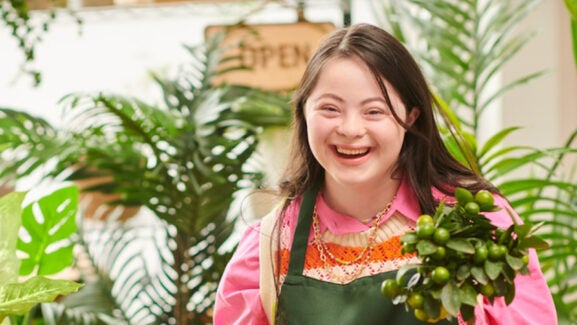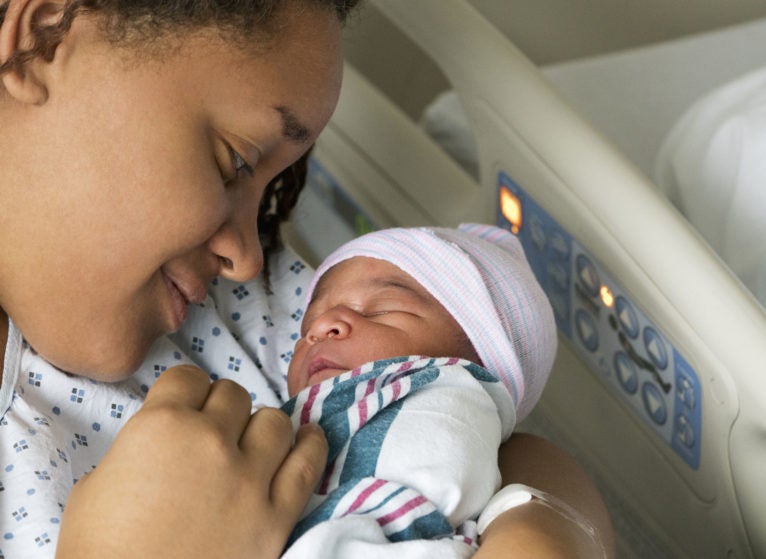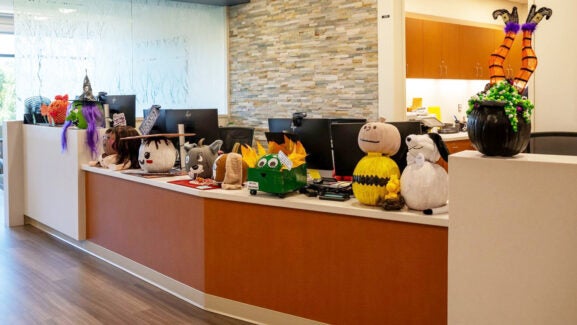

Black Maternal Health Week Events
This year marks the fifth anniversary of Black Maternal Health Week (BMHW), which will be held from April 11-17. In order to uplift Black women and their families, UVA Health is joining forces with Black Mamas Matter (BMMA) to center Black women’s scholarship, maternity care work, and advocacy across the full-spectrum of sexual, maternal, and reproductive healthcare, services, programs, and initiatives.
About Black Maternal Health Week
Founded and led by the Black Mamas Matter Alliance, BMHW is a week of awareness, activism, and community building intended to:
- Deepen the national conversation about Black maternal health in the US;
- Amplify community-driven policy, research, and care solutions;
- Center the voices of Black Mamas, women, families, and stakeholders;
- Provide a national platform for Black-led entities and efforts on maternal health, birth and reproductive justice; and enhance community organizing on Black maternal health.
Black Maternal Health Week was officially recognized by the White House on April 13, 2021.
The month of April is recognized in the United States as National Minority Health Month – a month-long initiative to advance health equity across the country on behalf of all racial and ethnic minorities. Additionally, UVA Health is joining dozens of global organizations who are fighting to end maternal mortality globally in advocating that the United Nations recognize April 11th as the International Day for Maternal Health and Rights.
The campaign and activities for Black Maternal Health Week serve to amplify the voices of Black Mamas and center the values and traditions of the reproductive and birth justice movements. Activities during BMHW are rooted in human rights, reproductive justice, and birth justice frameworks.
The BMHW 2022 theme, “Building for Liberation: Centering Black Mamas, Black Families and Black Systems of Care”, reflects BMMA’s work in centering Black women’s scholarship, maternity care work, and advocacy across the full-spectrum of sexual, maternal, and reproductive health care, services, programs, and initiatives. Additionally, the 2022 theme reflects the critical need for learning about Black Feminist and womanist approaches in strengthening wellness structures within our communities, across the Diaspora, as a revolutionary act in the pursuit of liberation and in the global fight to end maternal mortality.
Statistics
- Approximately 700 women die each year in the United States as a result of pregnancy or delivery complications. (Source: Centers for Disease Control)
- In 2020, Black women were most disproportionately affected with a mortality rate of 55.3 deaths per 100,000 live births, compared to 19.1 deaths per 100,000 live births, and 18.2 deaths per 100,000 live births for White and Hispanic women, respectively. (Source: CDC)
- The U.S. has an infant mortality rate of 5.6 per 1000 live births in 2019, with a health disparity among Black babies at a rate of 10.8 deaths per 1,000 live births in 2018. (Source: CDC)
- Black women are 3 - 5 times more likely to have a maternal death than White women in the United States. (Source: AJMC)
- Black mothers are more likely to suffer from PMADs (Perinatal Mood and Anxiety Disorders) like postpartum depression, in silence, and without clinical help. (Source: NCBI)
Events
UVA Program: The Impact of Doulas on Black Maternal Health | Watch now
Black, Indigenous, Women of Color heard, affirmed, honored, respected, cared for, loved and celebrated throughout their entire maternal journey. Black, Indigenous, Babies of Color heard, affirmed, honored, respected, cared for, loved and celebrated from conception to birth to adolescence to adulthood. Black, Indigenous, Families of Color heard, affirmed, honored, respected, cared for, loved, and celebrated in their communities.
Listening to the Living: Centering Black Women’s Birth Experiences | Tuesday, April 12 | 5:30 p.m. | virtual | Registration required
Nationally known experts and local voices will explore the current crisis of Black infant and maternal mortality in the U.S. and Virginia.
- Dr. Arthur James, MD, FACOG, will describe historical influences on racial disparity in birth outcomes, and factors that continue to cause disparities today.
- Patrice Wright, PhD Candidate, UVA Department of Sociology, will share her research about how Black women’s interactions with healthcare providers influence the quality of care and have impact on health outcomes for themselves and their babies.
- Local Black women will share their personal experiences of their birth journey in Central Virginia.
- Doreen Bonnet, Executive Director of Birth Sisters of Charlottesville, and Karen Waters, Community Education Coordinator, Albemarle County Public Schools, will join Dr. James and Patrice Wright in a panel discussion exploring a way forward to improve maternal health among Black families in our region.
- We will conclude with a unique call-to-action for medical professionals and providers who care for and make critical decisions affecting black women during their maternal journey.
- The program will be moderated by Eboni Bugg, Licensed Clinical Social Worker.
About our speakers and panelists:
Dr. Arthur R. James is a retired Obstetrician, Gynecologist, and Pediatrician who has been involved in the care of underserved populations for the entirety of his medical career. He is a former member of the Health and Human Services Secretary’s Advisory Committee on Infant Mortality, a former Associate Professor of Obstetrics, Gynecology, and Pediatrics at The Ohio State University Wexner Medical Center and Nationwide Children’s Hospital, former Co-Chair of the Ohio Collaborative to Prevent Infant Mortality, the former Interim Executive Director of The Ohio State University Kirwan Institute for the Study of Race and Ethnicity, former member of the board of Directors for the Centering Health Care Institute as well as the former Director of the State of Michigan’s Infant Mortality Task Force, former Co-Chair of the March of Dimes/Center for Disease Control’s Health Equity Work Group, and former Consultant to First Year Cleveland (a Cuyahoga County-wide effort to decrease infant mortality and eliminate the racial disparity in birth outcomes). His primary area of interest is EQUITY. He completed his undergraduate degree at Stanford University, Medical School at Washington University in St. Louis, and residency training at Nationwide Children’s Hospital and the University of Texas @ Houston Medical Center. Much of his approach to improving clinical outcomes is informed by the experience of being the youngest of six children in a poor family from an inner city, under resourced, marginalized and predominantly black community.
Patrice Wright received her Master’s Degree in Sociology from University of Virginia and is currently a PhD candidate in that Department. She also holds a Master of Arts in Teaching from Marian University. Her research interests include Race, Culture, Inequality and Medical Sociology.
Doreen Bonnet is Executive Director and doula with Birth Sisters of Charlottesville doula collective, an organization dedicated to dismantling root causes of systemic maternal health disparities for Black, Indigenous and People of Color. She has been providing perinatal support to women in the Charlottesville area for the last five years. She is a Certified Matrona Holistic Birth Doula, craniosacral therapist, and is working toward her certification as a Pre and Perinatal Practitioner, a DONA birth doula and a SIL postpartum doula. She has a BA in Communications/Public Relations from University of Louisiana at Lafayette and is a graduate of the Southwest Institute of Healing Arts with an emphasis on Asian Bodywork Therapy.
Karen Waters-Wicks is administrator of the Community Education Department for Albemarle County Schools in Virginia and an adjunct faculty member in the Humanities Department at Piedmont Virginia Community College. She also sits on the President’s Commission on Slavery and the local advisory board at the University of Virginia. She is past Executive Director of the Quality Community Council. She has served on numerous boards, committees, and task forces, including former governor Mark Warner’s task force on preventing crime in the minority community and the Charlottesville Housing Advisory Committee.
Eboni Bugg is committed to helping communities define and solve problems through creative and collaborative processes with the ultimate goal of liberation. She received an undergraduate degree in Biology from the University of Virginia, and holds a Master’s in Social Work from Virginia Commonwealth University. She is the Director of Programs at the Charlottesville Area Community Foundation where she oversees its discretionary grantmaking programs. She is a founding member of the Central Virginia Clinicians of Color Network and serves on the Virginia State Board of Social Work. Eboni is a Registered Yoga Teacher and passionate about the healing benefits of mindful movement, breathing and meditation.
It Takes a Village: Supporting Black Birthing Families in DC, MD, and VA | Wednesday, April 13 | noon-1 p.m. | virtual | Registration required
Join March of Dimes Greater DMV for a lunchtime conversation with partners about how their programs build community, create space for, and support Black families in our region. Panelists include Layo George, RN, MHSA, Founder and Executive Director, Wolomi; Patricia Liggins, Founder, Birth Supporters United; and Stephanie Spender, Executive Director, Urban Baby Beginnings
Health in Focus: Black Birth Workers | 2-3:30 p.m. | Webex | Registration required
Learn:
- What is a Black Birth worker?
- What are the experiences of Black birth workers and their clients?
- How can working with a birth worker as a compliment to hospital medicine or care?
- How is community medicine tied to social justice and equity?
Recommended audience:
- Library workers
- Public health workers
- Health professionals (nurses, medical students, family medicine, OBGYN)
- People considering using a birth worker
- Those interested in alternatives to traditional hospital services
- Those interested in maternal health, especially Black maternal health
Latest News



